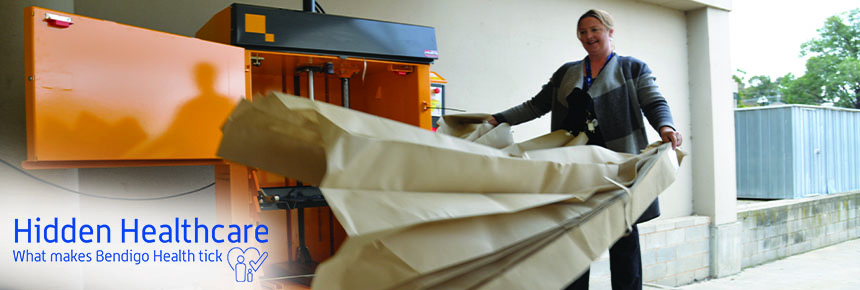 Bendigo Health has begun bailing disused bed curtains, which will be recycled into furniture.
Bendigo Health has begun bailing disused bed curtains, which will be recycled into furniture.
Cindy Bird can often be found gathering up rubbish around the hospital campus.
A frequent point of call is the multi-storey car park entrance, where she collects unwanted receipts at the foot of the ticket machine.
“Why can’t they offer you the option of not having a receipt instead of just printing one?”
Bendigo Health’s new waste officer is passionate about recycling, which is important when you consider the task ahead of her.
Over the past 12 months, Bendigo Health created 626,272 kilograms of waste at the Barnard Street campus.
471,000 kg of that was general waste, a further 72,272 was clinical waste and the remaining 83,000kg was recyclable waste.
“Our strategic plan is to reduce waste to landfill by 2023… I want zero waste,” she said.
“Everything I see in the hospital is possibly recyclable if it’s not contaminated in terms of clinical waste.”
Clinical waste is problematic, but not a lost cause, she believes.
Bendigo Health uses companies that recycle non-contaminated clinical equipment.
Oxygen masks, for example, are melted down and turned into flooring, which can be repurchased by the hospital.
Discarded medical tubing is also turned into everyday products, like gumboots and vinyl records.
Bendigo Health was recently awarded a sustainability in healthcare grant from the state government to buy a baler for bed curtains.
The curtains are bailed and sent to a recycling plant where they are turned into tables and chairs.
Plans are afoot for other recycling innovations.
Kimguard – a sterile plastic packaging around medical products – can also be collected, recycled and turned into furniture.
“Generally all our medical supplies come wrapped in this, we think we could capture it if we have some passionate staff that are willing to collect it,” Cindy said.
Single-use copper, which is used in diathermy pads in theatre to earth a patient during surgery, can also be recycled.
Outside of the clinical space, there are other areas for improvement.
Bendigo Health uses 556,000 polystyrene cups a year.
“I would like to move to paper. Paper can be recycled seven times and turned back into paper so it’s a valuable commodity,” she said.
In her six months in the role, Cindy has been inundated with queries from recycling-conscious nursing staff, ‘do we have to throw these out’, ‘can we use these again?’
“It’s great that nurses are thinking about it,” she said.

For more stories in our Hidden Healthcare series, click below.
Hidden Healthcare